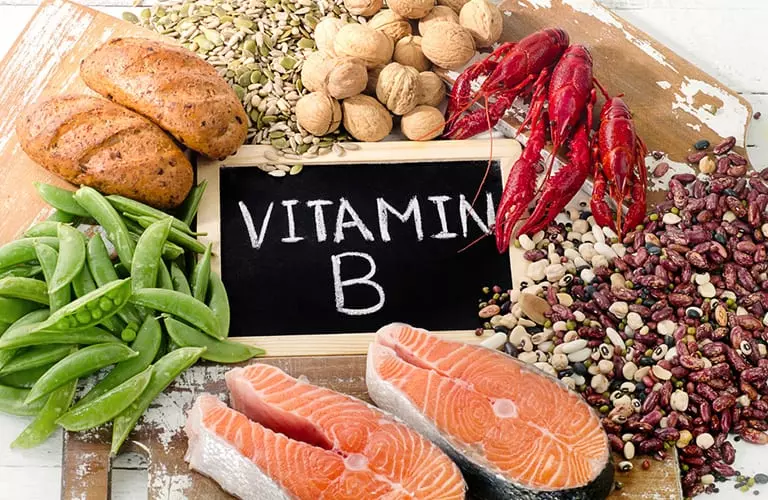With so many vitamins and supplements out there, it’s easier than ever to get overwhelmed with the selection. Which vitamins are essential to your health, and which are not so “important,” (i.e., won’t help you reach your health goals). One vitamin that we would slide into more of the “essential” category would be vitamin B.
Did you know that vitamin B refers to not one, but eight different vitamins? And all eight of these vitamins play a role in converting food into energy in the body. Let’s take a look at why vitamin B is so important to your overall health.
What Are B Vitamins
B vitamins are a group of nutrients that play many important roles in your body. Most people get the recommended amount of these vitamins through their diet alone, since they are found in a wide variety of foods like fish, poultry, eggs, meat, leafy greens, and dairy products. However, factors like age, pregnancy, dietary choices, medical conditions, genetics, medication and alcohol use increase the body’s demand for B vitamins.1 In these circumstances, taking a supplement with vitamin B might be necessary. Health supplements that contain all eight B vitamins are referred to as B-complex vitamins.
Different Types of B Vitamins
A whole host of B vitamins are available at health food stores. Along with thiamin (B1), most people are familiar with three other B vitamins: B9, B6, and B12. But there are eight B vitamins in all, and every one of them plays an important role in the function of the body’s cells and enzymes. In fact, they’re grouped together as “B” vitamins because of their closely related roles in cell and enzyme health.2
Vitamin B12 (cobalamin), for example, supports cell health and also helps the body make new DNA. People who don’t get enough B12 may feel tired and weak and can experience loss of appetite, weight loss, or nerve pain. Anywhere between 1.5% and 15% of Americans are deficient in B12. People older than 50 and those on vegan or vegetarian diets are at greatest risk of developing a deficiency.3 This vitamin is found in meat, eggs, seafood, and dairy.
We mentioned vitamin B1 earlier, which is thiamine. Thiamine plays an essential role in the metabolism by helping convert nutrients into energy. The richest food sources include pork, sunflower seeds, and wheat germ. 4
Vitamin B6, called pyridoxine, is involved in amino acid metabolism, red blood cell production, and also the creation of neurotransmitters. This vitamin can be found in chickpeas, salmon, and potatoes.5
Vitamin B9 (folate) is another B vitamin that most people are familiar with. Folate is needed for cell growth, amino acid metabolism, the formation of red and white blood cells, and proper cell division. It can be found in leafy greens and beans. Folic acid is a synthetic form of vitamin B9. It is used in supplements and added to processed food products, like flour and breakfast cereals. It is also one of the most important B vitamins to take during pregnancy, and for a very good reason. The proper amount of folic acid reduces the risk of your baby developing certain birth defects.6
Supplements to Consider
There are many B vitamins on the market, including B-complex vitamins, which include every B vitamin! If you’re not in the market for a full B-complex vitamin, look for one that contains the specific B vitamins that will help you meet your health goals. Also, it doesn’t hurt to try a B vitamin supplement that also contains other herbs and nutrients too. Some other herbs and nutrients that can help to support your health, in addition to B vitamins, include Aged Garlic Extract, GABA (gamma-amino butyric acid), and L-Arginine. Research on Aged Garlic Extract has shown that it supports overall heart health, helps maintain normal cholesterol and blood pressure levels, circulation, and immune function, as well as helping to reduce inflammation.7 GABA is a naturally occurring amino acid that works as a neurotransmitter in your brain. It is considered an inhibitory neurotransmitter because it blocks, or inhibits, certain brain signals and decreases activity in your nervous system, helping you feel less anxious and stressed.8 And the body uses L-arginine to help build muscle and rebuild tissue.9
So if you’re looking to increase your energy, enhance mood, stimulate the immune system, and form red blood cells, look no further than vitamin B! If you are unsure how to incorporate vitamin B into your supplement regimen, consult with your health care practitioner.
References
- https://www.healthline.com/nutrition/vitamin-b-complex#overview
- https://elemental.medium.com/should-i-take-b-vitamins-c82631d94c03
- https://www.healthline.com/nutrition/vitamin-b12-deficiency-symptoms
- https://www.healthline.com/health/vitamin-watch-b1-thiamine
- https://www.mayoclinic.org/drugs-supplements-vitamin-b6/art-20363468
- https://americanpregnancy.org/pregnancy-health/vitamin-b-pregnancy/#:~:text=Vitamin%20B9%3A%20Folic%20Acid,birth%20defects%20like%20spina%20bifida.
- https://www.healthline.com/health/gamma-aminobutyric-acid
- https://www.medicalnewstoday.com/articles/318174#What-is-L-arginine
This article is for informational purposes only. This article is not, nor is it intended to be, a substitute for professional medical advice, diagnosis, or treatment and should never be relied upon for specific medical advice.

Share this Post